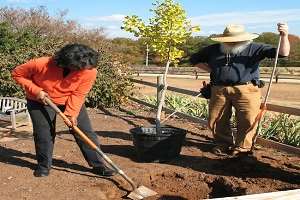Keeping landscape plants alive during the current drought conditions in Georgia takes some forethought, but it’s not impossible or illegal.

The Georgia Environmental Protection Division has imposed Level 1 and Level 2 drought restrictions across the state. Outdoor watering restrictions are in place to help manage and conserve water usage during times like these, when much of central and north Georgia has been in continuous severe drought for more than 20 weeks.
Working alongside green industry experts with the Georgia Urban Ag Council, University of Georgia Cooperative Extension specialists prepared a list of ways gardeners can conserve water in their landscapes while still following the water management rules.
The recommendations include the following:
- Choose plants that perform well in Georgia conditions, whether that’s extreme heat, cold, drought or above-normal rainfall.
- Preserve established plants. Established plants have an extensive root system and require less water than newly planted ones.
- Space plants with their mature size in mind to reduce competition.
- Concentrate seasonal color in small, high-impact areas to reduce overall water requirements.
- Avoid constructing raised beds under trees due to root competition for water.
- Develop a landscape plan before designing an irrigation system.
- Incorporate shade trees in the landscape to reduce water loss from evaporation.
- Divide the landscape into water-use zones, and select and group plants according to the similar water needs.
- Avoid small, irregular-shaped island plantings in turfgrass areas. They are difficult to irrigate.
- Consider irrigation sprinklers when designing turfgrass areas or planting beds.
- Move or eliminate plants not suited to their existing site.
- Be careful fertilizing and pruning during a drought as both encourage new growth and require additional water.
- Match surface and soil drainage conditions to plant moisture requirements.
This list is based on work by UGA Extension specialists and lessons learned by urban agriculture industry businesses committed to conserving water.
Source: uga.edu